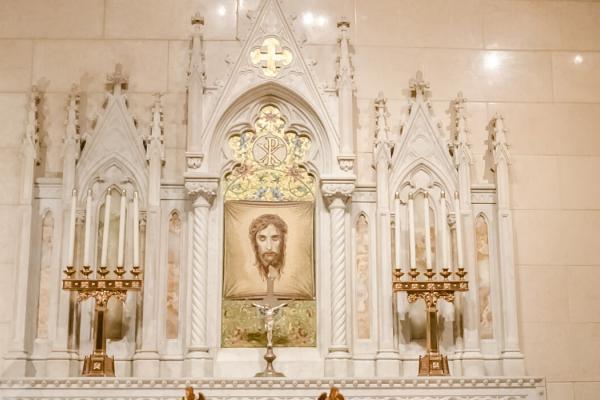In the wake of the Obergefell v. Hodges decision legalizing same-sex marriage, conservative Christian leaders sounded a dire word: Christians are no longer at home in the United States.
Rod Dreher, a senior editor at The American Conservative, wrote an article for TIME following the decision with the headline, “Orthodox Christians Must Now Learn To Live as Exiles in Our Own Country.” In his long-anticipated book, The Benedict Option, Dreher tells Christians to “embrace exile.” He alludes to the oft-used Jeremiah 29:7 in his conclusion when he says that “though in exile, we work for the peace of the city.” In a response to Jacob Lupfer, who penned an essay saying Dreher suffers from a “delusional persecution complex,” Dreher claims that Christians are “called by God to be faithfully present here in Babylon ... like Shadrach, Meshach, and Abednego.”
In a similar vein, Russell Moore, the president of the Ethics & Religious Liberty Commission of the Southern Baptist Convention, published a response to the Supreme Court decision in the Washington Post that concluded by calling Christians to “joyfully march to Zion” as “strangers and exiles in American culture.”
Moore is drawing here on the language of Hebrews 11, which describes believers as “strangers and exiles on the earth” (Heb 11:13, ESV). The idea of the follower of God as an exile has deep roots in the faith, originating in Israel’s history of exile in Assyria and Babylon.
But instead of “exiles on the earth,” Moore writes “exiles in American culture.” And Dreher speaks of being “exiles in our own country.” Everything hangs on this change.
Why Exile?
The idea of the church in exile is once again popular in American Christian circles. Missiologist Michael Frost wrote Exiles: Living Missionally in a Post-Christian Culture in 2006. In 2008, before his own exile from the evangelical community, Rob Bell coauthored Jesus Wants to Save Christians: A Manifesto for the Church in Exile. New Testament professor James Thompson wrote The Church in Exile: God’s Counterculture in a Non-Christian World in 2011. And in 2015, Lee Beach of McMaster Divinity College published The Church in Exile: Living in Hope After Christendom.
Why the attraction to exile? For many of those in the missional church movement, exile language offers an alternative to the “culture war” rhetoric of the religious right. Instead of a church at war with surrounding culture, a church in exile presents a vision of God’s people living peacefully within foreign territory.
Seeking the welfare of a foreign city (Jeremiah 29:7) is certainly an improvement over waging constant battle against it. But what does the idea of exile imply about the church? And is it consistent with Christian faith?
Exile means that one is barred from one’s native land. The people of Israel, for instance, were prevented from living in the land promised to them by God. Followers of Jesus, however, have no native land. The Great Commission at the end of Matthew finds Jesus telling his followers to “make disciples of all nations” (Matt 28:19). In the Acts of the Apostles, Jesus tells them “you will be my witnesses ... to the ends of the earth” (Acts 1:8).
If the message of Christian faith is for all peoples and nations, then how can the New Testament writers speak of believers as exiles? The answer is that, for Christianity, the whole earth is a foreign land.
In the Gospel of John, Jesus prays: “I have given them your word, and the world has hated them because they do not belong to the world, just as I do not belong to the world” (John 17:14). If the world is a foreign land, then the church is by definition in exile. But so the adage: If everything is exile, nothing is exile. Because the whole world is alien territory, no culture has a privileged position in relationship to God. Every culture is equally close and equally distant from the new creation. For those who follow Jesus, every person is a neighbor and every place is a home.
Talking about the church in exile is redundant, unless there is a change in the definition.
Exile and Christendom
Notice the book titles mentioned above. They describe the church in exile within “a post-Christian culture,” “a non-Christian world,” and a society “after Christendom.”
To be sure, many of these authors would view the experience of exile as a good thing. They do not necessarily think “Christendom” was a golden age to which we ought to return — and yet the decision to define the church as exilic allows Christendom to set the terms for the conversation.
Speaking of the church in exile within American culture suggests there is some ideal culture — according to Dreher, “the Judeo-Christian culture of the West” — in which the church would not be in exile. Once we make that move, we have abandoned the early church’s insight that the church is exiled from every culture.
We end up pining for the Christendom of earlier history, when in fact the only true Christian world exists beyond the end of history.
But the problem goes deeper. Thinking of the church as exiled from a particular culture further implies the church has its own. Dreher compares the evangelical church to the monastic communities of St. Benedict, while Moore views the church as a new Israel marching to Zion. This idea of church as a specific culture has implications for mission. Moore makes this explicit when he calls American culture “our mission field."
Imperialism or Separatism — or Something Else?
There are only two options at this point: Either the church spreads its culture to others or it assimilates its own into distinct community. The former is the way of imperialism, while the latter is the way of separatism.
Israel’s mission is of the separatist variety, as defined especially by the book of Deuteronomy, whose message can be summarized as a warning to Israel to remain distinct from the other nations. The prophetic tradition interprets the Babylonian exile as God’s judgment on Israel’s failure to remain separate from other cultures.
Yet the overall message of the New Testament, especially the book of Acts, is that the church is not a separate community with its own culture. The power of Christianity is found in what scholars of mission call its capacity for contextualization, which means that the message of Christ can be translated into different languages, cultures, and contexts.
According to Lamin Sanneh, the Gambian missiologist and professor at Yale Divinity School, the Gospel comes “without a revealed language or a founding original culture,” and therefore “all cultural forms ... are in principle worthy of bearing the truth of Christianity.”
Christians today who adopt an exilic identity have abandoned this dimension of Christianity. They are giving up on the contextualization principle. For them, contemporary American culture is enemy territory, and the only recourse is to retreat into a separate cultural community.
This does not mean, of course, that a church contextualized within the United States would uncritically affirm the culture. But it does mean we need to consider more thoughtfully what exactly constitutes the truth of Christianity and how this truth might relate to its given context.
Returning Home After Exile
The Barna Group’s “Faith That Lasts” project, conducted over five years between 2007 and 2011, revealed that nearly a quarter of 18- to 29-year-olds (23 percent) said that “Christians demonize everything outside of the church” was a statement that “completely” or “mostly” described their experience.
Christians have largely left behind the days when their faith was defined by prohibitions against drinking, dancing, and movies. But the exile mentality remains: Today, Christian culture may be more ideological than moral, the us-versus-them logic more pervasive and more subtle.
The church communicates an exilic message when it speaks about the need to evangelize “the West” as if this need is greater now than in the past, when it associates “the world” specifically with American culture, or when it waxes longingly about how much better things were “back then” or are “over there.”
The church needs to abandon talk of exile, and reclaim the possibility of being at home. Home is the cultural context within which the church already exists. Reclaiming home does not mean uncritically adopting whatever seems fashionable at the time. It means approaching cultural changes and developments with an attitude of openness and hospitality, with a readiness to embrace rather than exclude. Reclaiming home means obeying the biblical injunction to live wholly without fear or anxiety.
Many Christians have already put down their weapons to fight the culture. It is time now to put down the walls of defense that keep them separated from the culture. Perhaps a future generation will yet say that “Christians love everything outside of the church.”
Got something to say about what you're reading? We value your feedback!

